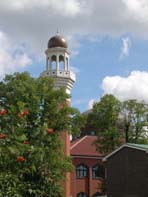Ken’s Islam study
By Julian Petley
Campaign for Press and Broadcasting Freedom, 24 January 2008
ON 13 November, London mayor Ken Livingstone launched The Search for Common Ground, a study commissioned by him that looks at the portrayal of Muslims and Islam in the national media. Julian Petley, co-chair of the CPBF, reports…
The report recommends that news organisations employ more Muslims (along with other minorities) so their workforces are more representative of the society and the world on which they report; that news concerning Islam and Muslims should – like all news – be accurate; and that when reporting on sensitive and difficult subjects, such as those involving members of Britain’s minority communities, those working within news organisations should at least reflect on the possible consequences of their actions.
Not a great deal to ask, one might think.
But apparently it is. However, rather than engaging critically with the substance of the report its critics, such as Nick Cohen and John Ware, merely looked “behind” it and discovered (entirely erroneously) bogeyman-of-the-moment the Muslim Council of Britain (MCB) and, armed with this “fact”, dismissed the whole thing out of hand as irredeemably biased. Bizarrely, Inayat Bungawala of the MCB has been repeatedly fingered as the author of the chapter on the controversial John Ware 2005 Panorama episode “A Question of Leadership”, when, as is clearly acknowledged in a footnote, the author is in fact me.
Perhaps journalists feel that reading such “academic” features as footnotes is beneath them. But, whatever the case, it certainly helps to prove the report’s contention that when newspapers deal with stories concerning Muslims and Islam, normal journalistic standards of accuracy (never exactly high in the first place) are thrown out of the window.
Of course, it’s compulsory that those who have the temerity to suggest the media might try to report more accurately, or more sensitively, or, God forbid, more responsibly, must be presented as would-be commissars and censors. So, bang on cue, up pops the hardly disinterested John Ware in the Sunday Telegraph to claim that the report’s call for more community-sensitive reporting about multi-culturalism and British Muslim identities “suggests that the aim of the ‘experts’ is to put political Islam beyond the scope of media enquiry”.
Again, the heavy-handedly ironic use of inverted commas is absolutely de rigueur in self-serving and anti-intellectual nonsense such as this, but the piece does have the virtue of proving once again that Will Hutton was correct when he wrote: “Britain’s least accountable and self-critical institutions have become the media – and the way they operate is beginning to damage rather than protect the society of which they are a part.”
It also reminds us that when Corporal Jones in Dad’s Army proclaimed “they don’t like it up ’em” he was of course referring to journalists and not to Germans. However, freedom from censorship (is not the same thing as freedom from censure. But media freedom brings with it certain responsibilities; indeed, as I point out in the recently published Freedom of the Word, media freedom in modern societies is largely premised on the idea that the media play a key role in the democratic process.
Onora O’Neill said in a 2003 lecture to the Royal Irish Academy: “Democracy requires not merely that the media be free to express views, but that they actually and accurately inform citizens. If we are to have democracy, the media must not only express views and opinions but must aim to communicate and inform … Inadequate reporting, commentary and programming may marginalise important issues or voices, may circulate inaccurate or manipulated ‘information’, and may suppress or distort material that is relevant to its own assessment. It damages democracy by making it hard, even impossible, for citizens to judge for themselves.”
So, precisely to the extent that the media fail to perform their proper democratic role, the arguments for defending their freedom become proportionately weaker. Sadly, The Search for Common Ground shows all too clearly how, when it comes to representing Muslims and Islam, the media, and especially the press, frequently fail every one of O’Neill’s tests.
Inaccurate reporting, distortion, ill-informed commentary, the further marginalisation of already marginalised voices – these are all so common as to be routine across vast swathes of newsprint, and are now, as demonstrated by Ware’s Panorama episode, beginning to infect broadcasting as well. If an increasing number of people, and by no means simply Muslims, think (quite wrongly, in my view) that media freedom is no longer worth defending, the media should look to themselves for the reasons, and not make wild accusations about their critics, an increasingly numerous and well informed band.
Julian Petley is Professor of Film and Television at Brunel University, and co-chair of the Campaign for Press and Broadcasting Freedom. Censoring the Moving Image, which he co-authored with Philip French, will shortly be published by Seagull Books/Index on Censorship

 A small metal cross in Oxford’s Broad Street marks the spot where one of the worst acts of religious bigotry in English history was perpetrated: the burning of bishops Latimer and Ridley – the Oxford Martyrs – during the reign of Mary I, Bloody Mary, the last Catholic ruler of England.
A small metal cross in Oxford’s Broad Street marks the spot where one of the worst acts of religious bigotry in English history was perpetrated: the burning of bishops Latimer and Ridley – the Oxford Martyrs – during the reign of Mary I, Bloody Mary, the last Catholic ruler of England.